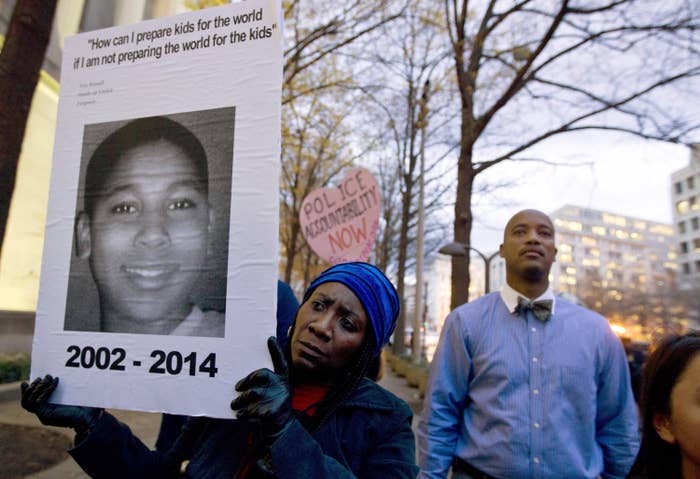
No federal criminal charges will be filed against the two Cleveland police officers who shot and killed 12-year-old Tamir Rice in 2014, the Department of Justice announced Tuesday, arguing there wasn't enough evidence to concretely determine what happened at the time of the shooting.
As for video of the deadly shooting that showed officers shooting the boy just two seconds after stepping out of their patrol cars, federal prosecutors said the quality and angle of the grainy, time-lapse footage failed to show whether Tamir had reached for what officers thought was a handgun.
The object turned out to be a black toy Airsoft pistol that the 12-year-old had been playing with at Cudell Park Recreation Center just minutes before he was killed.
The video, plus the conflicting analysis of seven use-of-force experts, was not enough to determine "beyond a reasonable doubt" the two officers had willfully broken the law, according to the DOJ.
"Although Tamir Rice's death is tragic, the evidence does not meet these evidentiary requirements," the DOJ said in a statement. "It is important to note that the footage is grainy, shot from a distance, does not show detail or perspective, and portions of the incident are not visible because of the location of the patrol car."
Tamir's death and the shocking footage of the shooting became one of the earliest, high-profile killings of Black people by police that propelled the Black Lives Matter movement into the national discourse. For more than five years, the movement has since sparked countless protests in cities across the country and launched a political push to divert law enforcement funding toward social programs.
In announcing its decision on Tuesday, the Department of Justice noted that not only must prosecutors show "beyond a reasonable doubt" that law enforcement's use of force was unreasonable — from the officers' perspective — but that the officer "acted willfully to deprive an individual of a federally protected right."
"This high legal standard — one of the highest standards of intent imposed by law — requires proof that the officer acted with the specific intent to do something the law forbids," the statement added. "It is not enough to show that the officer made a mistake, acted negligently, acted by accident or mistake, or even exercised bad judgement."

A state grand jury also declined to file charges against the officers.
Tamir had been playing with the toy gun outside a recreation center on Nov. 22, 2014, when police received a report that someone was pointing a gun at people.
The caller reported that the person with the gun was "probably a juvenile" and that the weapon was "probably a fake," but that information was not related to officers Timothy Loehmann and Frank Garmback, who sped toward the park.
Tamir was sitting on a bench when officers skidded to a stop just feet from the gazebo, and Loehmann fired two shots less than two seconds after opening the car door.
Loehmann, according to the statement, "repeatedly and consistently" stated Tamir was reaching for what looked like a handgun. Both officers testified they had given Tamir "multiple commands to show his hands before shooting."
The two officers were the only witnesses near the shooting when it occurred, and the Department of Justice noted that the video that captured the shooting did not show Tamir's hands at the moment the shots were fired, making it unclear whether he had been reaching for what turned out to be a toy gun.
The Department of Justice also pointed out that out of seven experts that reviewed the case, four of them agreed that the shooting had been objectively reasonable — all four of those experts had been hired and provided by the Cuyahoga County Prosecutor's Office. Three of the experts found the shooting had been objectively unreasonable — all of them hired by Tamir's family.
Yet the basis of their determination —the video — meant that they "added little to the case," according to the Department of Justice.
"The evidence in this case fails to definitely establish what happened at the time of the shooting," the statement added. "Based on this evidence and the high burdens of the applicable federal laws, career prosecutors have concluded that there is insufficient evidence to prove beyond a reasonable doubt that Tamir did not reach for his toy gun."
